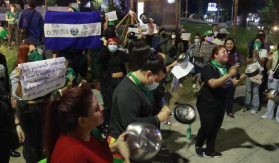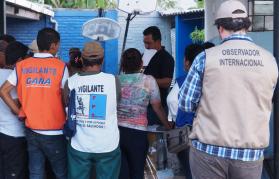Resisting CAFTA and Metal Mining in El Salvador
from Z Magazine
By Leah Wilson, CISPES
|
|
OnFriday, January 8, hundreds of people arrived in the rural town ofTrinidad, El Salvador to hold vigil for the "martyrs of the struggleagainst mining." Five lives had already been lost due to violenceagainst anti-mining activists. People came from across the country todemonstrate their solidarity with the victims and their rejection ofmetallic mining in their country.
Betweenmusical groups playing traditional revolutionary songs and a youngrapper from nearby San Isidro with a message of social justice, a younglocal priest spoke to the crowd: "Our family and friends are beingmurdered. Environmental damage has already been done. The harmony ofour town has been torn apart. And this foreign mining company, PacificRim, has the gall to call itself the victim. Here, they are thecriminal. How can they call themselves a victim internationally?"
Longbefore December 17, 2004, when El Salvador became the first CentralAmerican country to sign on to CAFTA, economists, members of theleftist Farabundo Martí National Liberation Front (FMLN) party, andleaders of the Salvadoran social movements warned that the tradeagreement would increase poverty, worsen labor conditions, andundermine national sovereignty. In the months before CAFTA's approval,popular mobilizations highlighted the people's rejection of the tradeagreement. They were met with violent police repression and amulti-million dollar government funded pro-CAFTA campaign. The finalapproval by El Salvador's Legislative Assembly took place in a midnightsession fraught with deal-making and surrounded by hundreds of riotpolice to keep the protesters at bay.
Almostfive years later, basic living costs have skyrocketed as CAFTA hasdestroyed the already-neglected agricultural sector and one of the mostinsidious parts of CAFTA—the investor protection clauses—is just nowbeing revealed. Chapter 10 of the trade agreement contains the articlesthat allow foreign corporations to sue governments for violating their"right" to profit. Economists like Raul Moreno from El Salvador'sFoundation for the Study of the Application of Law (FESPAD) have beenwarning the public about these articles since the beginning. Morenoexplains that these articles are "the real attack on nationalsovereignty. If a country takes an action or creates a law to protectits citizens, to protect its workers, or to protect its environment, aforeign company can now sue the country for infringing on theirprofits."
InApril 2009, Canadian-based Pacific Rim became the first companyoperating in El Salvador to file such a lawsuit under CAFTA, suing thecountry for hundreds of millions of dollars in damages. The company isalleging that the government violated CAFTA's investor protectionclauses by not issuing the company mining exploitation permits. As aCanadian company, Pacific Rim is not a party to CAFTA, but it filed thesuit through a Reno-based subsidiary that they acquired just beforedeciding to sue.
The El Dorado Mine
TheEl Dorado gold mine, located in San Isidro, was purchased by PacificRim in 2002. They obtained exploration permits from the Ministry ofEconomy and the Ministry of the Environment and Natural Resources andbegan exploratory drilling, accompanied by a massive media campaign.Radio and newspaper spots talked about a technique called "mineríaverde" or "green mining"—an extraction method that is supposedlyenvironmentally and socially responsible. But, according to LuisGonzález of the Salvadoran Ecological Society (UNES), this method is aPR invention of the mining company. "There is not a single scientificor industrial publication that mentions such a technique," saysGonzález. "And the social, environmental, and health impacts of goldmining would be very damaging to El Salvador."
Asearly as 2005, community organizations in Cabañas became suspicious ofPacific Rim's "green mining" claims and began doing research. Theyvisited the Valle de Siria gold mine in Honduras, which used the sameextraction method Pacific Rim was planning. Miguel Ángel Rivera, wholives near the El Dorado site and is a member of the Friends of SanIsidro Cabañas (ASIC), went on one of the visits to the Honduran mine."The health problems were shocking," he says. In Valle de Siria, theinfant mortality rate is 12 times higher than the national rate. "Weknew we could not just let this happen to our communities and ourchildren so we started educating ourselves more." The local communityorganizations began their own research and started public educationcampaigns to fight the company's misinformation.
Accordingto Pacific Rim's own Environmental Impact Study, gold extraction at ElDorado would use almost 240,000 gallons of water a day. That is thesame amount of water used by an average Salvadoran family during 20years. El Salvador already has the least access to clean drinking waterof any Latin American country. Pacific Rim proposes using a cyanideextraction method at the El Dorado site, located in the basin of theLempa River. Lempa is El Salvador's largest river and provides overhalf the drinking water for the metropolitan area surrounding ElSalvador. Experts at UNES and Oxfam America say cyanide, heavy metal,and acid runoff would poison the river's aquifers.
Communitygroups in Cabañas used popular education to inform residents of thezone about the mining threat and began organizing to let Pacific Rimand the Salvadoran government know they would not allow mining todestroy their communities. They collected signatures of communitymembers opposed to the project.
Inthe community of Trinidad, the Cabañas Environmental Committee (CAC)organized mass protests that effectively blocked the arrival of PacificRim's equipment. Campesino families, community priests, and youthleaders united to reject what they call the "death projects"threatening the region. Their unified chant at marches, blockades, andfestivals is short and to the point: "No to mining, yes to life."
In2005, the Cabañas resistance joined with communities fighting mining inother departments of the country, as well as national NGOs, includingUNES and FESPAD, to form the National Roundtable Against MetallicMining in El Salvador. MESA, as the coalition is known, organizednational public education campaigns to inform everyone in El Salvadorabout how the proposed mining projects in rural communities would havenational ramifications. With radio spots, public forums, andleafleting, MESA made the mining threat a topic of national discussion.They also did lobbying work, getting institutions and elected officialsto take positions on the issue.
In2005, when Pacific Rim applied to the Ministry of the Environment andNatural Resources for permits, the government of then-President TonySaca of the right-wing Nationalist Republican Alliance (ARENA) waveredin granting the permits. Then, during the electoral period of 2009,Saca made a public pronouncement against metallic mining, saying hewould rather pay fines of hundreds of millions of dollars than grantpermits to Pacific Rim.
"EvenARENA, which is always on the side of the transnationals over thepeople, knew that the political costs of approving the permits would betoo high," explains William Castillo of the Center for Investigation ofTrade and Investment (CEICOM), a member organization of the MESA.But the effectiveness of the movement's organizing, according toCabañas activists, was such a threat to mining interests that acampaign of terror soon began.
Death Threats and Murder
In2009, the murders of three prominent anti-mining activists in Cabañasleft the local and international community shocked and angered.
InJune, Gustavo Marcelo Rivera—president of ASIC and a local FMLN partyleader—was forcibly disappeared, tortured, and murdered. Before hisdisappearance, Rivera reported that he was receiving death threatsspecifically referencing his anti-mining activism. When his body wasfound in a well 12 days after he disappeared, the police offered anexplanation of gang-related violence, saying Rivera had been killedafter a heated argument while drinking with gang members.
Friendsand neighbors reject this explanation, noting that Rivera was not adrinker and did not know any gang members. His brother Miguel ÁngelRivera says, "The police investigation did not even mention hisanti-mining activism or that he was a local FMLN leader. Politicalmotives for his murder were never investigated."
FollowingRivera's assassination in December 2009, two active members of theCabañas Environmental Committee (CAC) were shot and killed in the ruralcommunity of Trinidad. Vice-president of the CAC, Ramiro Rivera (norelation to Gustavo Marcelo) and his neighbor Felícita Echeverría wereshot and killed on their way back from a fishing trip. A female teenagepassenger was also shot, but survived. Ramiro Rivera was under 24-hourpolice protection at the time of the attack, a service given to himbecause he was receiving similar threats to those received by GustavoMarcelo Rivera. The two officers present did not stop the attack, norwere the gunmen captured.
Justsix days following the double homicide, Dora Alicia Sorto was shot andkilled while returning from doing laundry with her children. Sorto, anactive member of the CAC, was eight-months pregnant when she wasmurdered. Her two-year-old son was shot in the foot but survived.
"Ourcommunities have never seen this type of violence," says HectorBerríos, a resident of Cabañas and member of the Francisco Sánchez 1932Unified Movement (MUFRAS-32), an organization active in the anti-miningresistance. "Cabañas is the third least violent department [of 14departments] in the country," Berríos explains. "It wasn't untilPacific Rim showed up that the violence began."
Todate, none of the murders have been thoroughly investigated andactivists continue to report attempted kidnappings and death threats.Reporters at Radio Victoria, a community radio station in Cabañas,regularly receive death threats via email, text messages, and phonecalls about their opposition to the Pacific Rim project.
National Sovereignty & CAFTA
Anotherthreat is the high cost of the company's lawsuit against the State.According to Pacific Rim's Notice of Intent to Sue, they are seeking aminimum of $77 million in damages, though Pacific Rim CEO Thomas Shrakehas stated the company is seeking up to "hundreds of millions ofdollars" in damages. If that number seems amorphous, it is becauseChapter 10 of CAFTA paints broad strokes when defining "investment."According to Article 10.28, "investment" is defined to include "thecommitment of capital or other resources, the expectation of gain orprofit, or the assumption of risk." Companies can sue not only formoney invested, but for the money they thought they were going to earn.
WilliamCastillo of CEICOM explains how Chapter 10 supersedes El Salvador'sdomestic laws: "Even though Pacific Rim did not establish sufficientenvironmental protections in its Environmental Impact Report or carryout an informed public consultation—both of which are required underSalvadoran mining law to obtain exploitation permits—they are now ableto sue us because of this trade agreement that a past government signeddespite of civil society rejecting it." In the case of Pacific Rim andEl Salvador, the arbitration process is taking place behind closeddoors in Washington, DC at the International Center for the Settlementof Investment Disputes (ICSID)—an institute of the World Bank—asstipulated by CAFTA. A hearing took place on January 18, 2010, with ElSalvador presenting its initial objections to the lawsuit and PacificRim responding. The next hearing is scheduled for late May .
Anti-mining protest in El Salvador |
Thereare currently 29 mining projects with exploration permits throughoutthe country, all of which are meeting resistance from organizedcommunities. A favorable ruling for Pacific Rim would set a precedentthat could result in an avalanche of lawsuits against the Salvadorangovernment. The U.S.-based mining company Commerce Group has alreadyfollowed Pacific Rim's example by filing a similar suit before theICSID in June 2009. MESA has pointed to the risk of establishing atrend throughout the region, the effects of which could be even moredevastating in countries like Guatemala and Honduras where communitiesare fighting more entrenched and powerful mining companies likeGoldcorp.
InEl Salvador, just one lawsuit would be financially devastating, as thecountry is already in significant debt. The new Administration ofMauricio Funes, who took office June 1, 2009, is already burdened bythe huge national debt and a weak domestic economy that pastadministrations left behind. The new Administration's social investmentinitiatives could be made impossible should it have to pay damages tojust one mining company, let alone 28 more.
"Whatwe are really seeing is how CAFTA, a trade agreement imposed on ElSalvador by the right wing and the U.S. government, serves as a toolfor transnationals to override national laws," explains AlexisStoumbelis, executive director of the Committee in Solidarity with thePeople of El Salvador. "During the campaign, Obama promised a revisionof these trade agreements, but has so far not taken any steps in thatdirection. Rather, he has continued negotiating similar agreements withother countries," Stoumbelis explained. "Now is the time to call onObama to make good on his promise. The first step is to reveal the trueface of these trade agreements everywhere we can."



